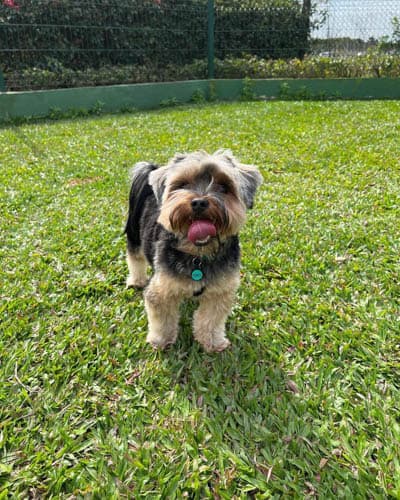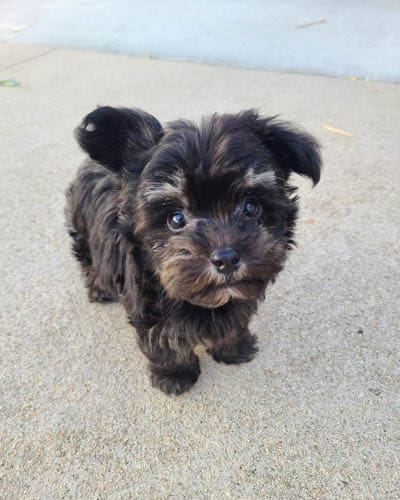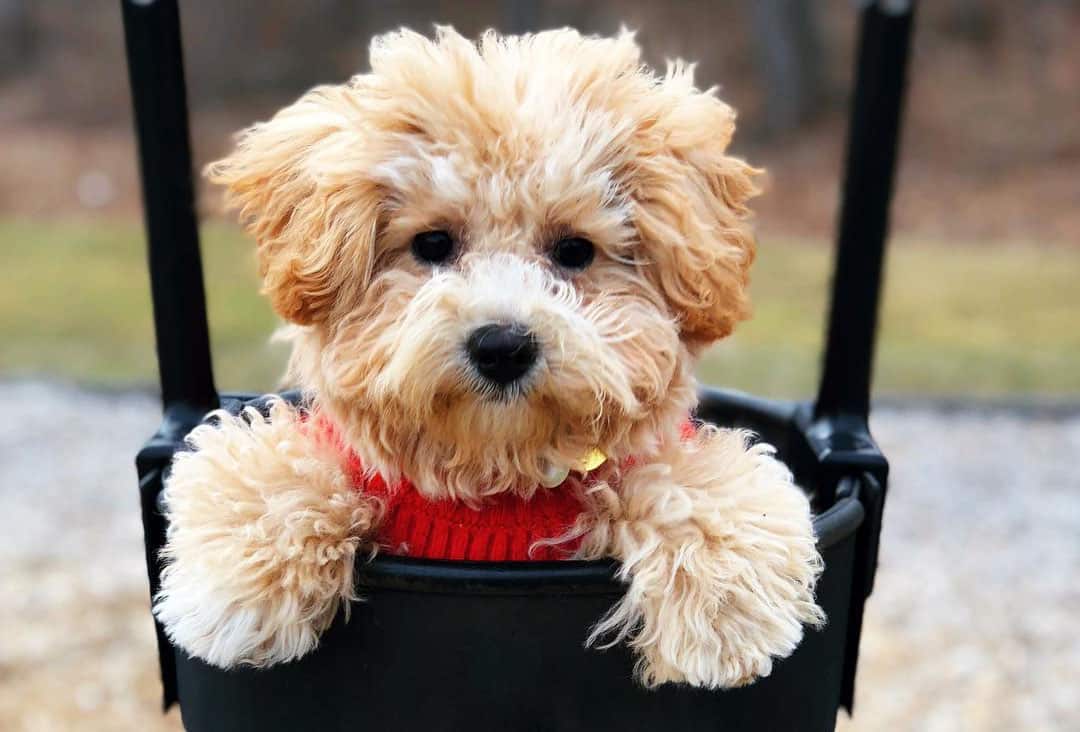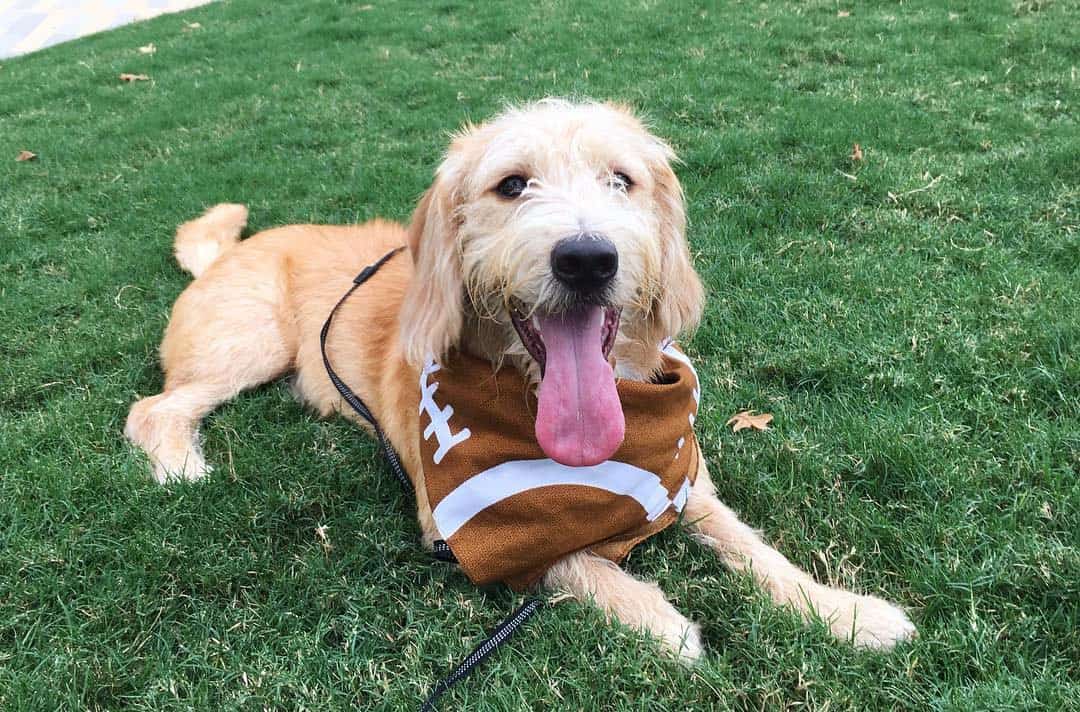The intellect, bravery, independence, and activity of Yorkiepoo dogs are well known. With a good blend of Poodle and Yorkshire Terrier temperaments, they make lovely companions for most households.
If you’re thinking about getting a Yorkiepoo, or any mixed-breed dog, you should be aware of some frequent behavioral issues that they have.
This post will discuss everything you need to know about these problems and what you should do when you encounter them.
1. Excessive Barking
The excessive barking of small poodles, terriers, and many small crossbreeds is widely recognized. Unfortunately, small Yorkiepoo can also experience this problem, especially if they are bored or haven’t exercised daily.
This breed, which is occasionally used as a lapdog, tends to be too protective, making them occasionally yappy.

It’s critical to remember that some barking, particularly when a dog is enthusiastic, is very normal. But if excessive barking bothers you, it’s critical to discover a training strategy that works.
Make sure your dog has been trained to know when to bark and when not to. In this regard, puppy preschool can be quite beneficial.
When the dog barks is another significant factor to take into account. Is it because you’re socially awkward, afraid, or lonely?
Sometimes removing the cause—such as by socializing training or de-stressing morning rituals—can be beneficial. However, more exercise is generally beneficial for dogs.
Together, go on your daily stroll, hoping the barking will lessen. For example, if you want to take more drastic action, you might consider getting a barking collar or hiring a trainer.
2. Stubbornness
The Yorkiepoo’s trainable temperament makes it easy to train. They can rapidly understand what is needed thanks to their intelligence, and they probably enjoy social situations.
Returning to their parentage, remember that your Yorkiepoo’s Yorkshire Terrier ancestors had developed into independent hunters, so you know who to blame if it is stubbornly independent.

Independence is typically a wonderful quality in Yorkiepoos. This quality makes training simple for the owner, although your Yorkiepoo could occasionally be stubborn.
This tendency frequently rears its ugly head if training is rigorous or becomes monotonous. They are free to resist and give up.
The Yorkiepoo needs leadership training like every other breed of dog worldwide. When a dog doesn’t have a leader, the Yorkiepoo feels anxious, and it becomes difficult for him to locate a leader daily.
Only the owner can handle this problem efficiently; owners must tenderly demonstrate that they are the leaders by giving their dogs food with their own hands, taking them for walks, and training the dog to obey them.
These are just a few ways the owner can continue to have complete control over the dog’s behavior.
Any dog can become obstinate when training becomes tedious or difficult. When training becomes monotonous, keep things interesting and vary it. After all, a little variation wouldn’t hurt anyone.
When training your Yorkiepoo, use positive reinforcement. Keep the exercises brief, entertaining, and difficult.
Throughout the training procedure, reward the puppy with praise and treats. This is effective, particularly when teaching routine commands and tricks to puppies.
The Yorkiepoo can be easily distracted by other dogs, automobiles, and kids, just like any other dog.
So when you see a human while out on a stroll with the dog, and they don’t bark, occasionally reward them with treats. These factors will encourage long-term good behavior.
3. Aggressiveness

A Yorkiepoo may act aggressively toward everyone for a variety of reasons. For example, it may come down to who has control, the owner or the dog. It can also be a memory of unpleasant things when the dog was a young puppy.
Even puppies as young as 6 to 7 weeks old might have behavioral issues. The Yorkiepoo should often socialize with other animals and people at this young age since it is so important.
This action prevents Yorkiepoos from biting people and helps them feel at ease in various settings.
Removing the puppy from the litter at an early age is another factor that makes Yorkiepoos act aggressively. Young Yorkshire terriers should never be subjected to harsh treatment.
Screaming, punching, or other severe punishments can cause the Yorkiepoo to become highly aggressive in the future.
Since Yorkiepoos are not typically an aggressive breed, a specialist should investigate this behavior further.
To eliminate these factors, ensure your dog has attended puppy schools and behavior classes, has had all necessary doctor checkups, and is accustomed to being around other animals and people.
4. Shyness

Not all Yorkiepoo behavioral issues are related to aggression; some of their behavioral issues might also be related to shyness.
For example, examining the dog’s ears to see whether the Yorkiepoo has shyness issues is crucial. The ears will drop back against the head if the dog is timid.
Other indicators of shyness include dilated pupils and increased panting in dogs around unfamiliar individuals.
Therefore, teaching the dog that there is nothing to be shy about if you want it to lose its shyness is crucial.
Never acknowledge the dog’s timidity and never comfort it. Show your appreciation and praise when the dog tries something new and brave.
By taking the Yorkiepoo to various locations and exposing it to people and other animals, you can ensure that it becomes adjusted to its surroundings and new people. The dog’s shyness will undoubtedly be overcome thanks to this socializing.
5. Unwanted Digging
Yorkiepoos, like their Yorkshire Terrier parent, have a reputation for digging. While most dogs won’t exhibit this behavior, some might; since the original Yorkshire terriers were initially used as hunting dogs, this digging habit has been ingrained in the dog over many generations.
However, this dog breed became popular with the affluent and famous during the Victorian era, but their natural digging propensity has persisted ever since. Sand, gravel, or soil digging are all favorites of Yorkiepoos.
Give your Yorkiepoo some toys to play with to prevent digging, backing, and attempts to flee when you are outside.
Distraction is a significant factor in getting rid of digging activity. When Yorkiepoo is about to dig or is already digging, divert their attention.
Toys like interactive treat dispensers, tug ropes, and stuffed Kongs can significantly reduce boredom.
They will be entertained for hours if you surround them with many dog toys. Reward the dog when it follows the command; excessive yelling will only worsen matters.
6. Jumping Excessively

The Yorkiepoo jumps around. Given their diminutive stature, they can jump far higher than one might anticipate—some say up to five feet.
This is frequently how they welcome guests and new acquaintances, so you should teach a clear “off” command.
A Yorkiepoo can sometimes be too confident, may become super enthusiastic while meeting new dogs, and may carelessly charge a larger dog without a second thought.
Supervision is advised to prevent potentially dangerous situations when allowing dogs to meet for the first time.
You can try to halt the jumping if it becomes too much for you by turning around and not paying your Yorkiepoo any attention.
Your dog may take any positive or negative response as a sign of encouragement and may continue to jump at you if you don’t ignore it.
If your Yorkiepoo jumps a lot, you should probably strive to reduce or even stop it entirely. But, as previously indicated, ignoring your Yorkie is one method to accomplish this.
Turn away from your dog if it starts to jump up at you. Since any movement or motion could be interpreted by your Yorkiepoo as a form of encouragement, try to keep your arms crossed and quiet.
Your dog should quit jumping once it learns it is not getting any attention from you and move on to the next trick to grab your attention. If you do this often enough, the animal will discover that jumping does not yield the desired results.
You can also try rewarding your Yorkie when it doesn’t leap up by doing so. Make sure you have some goodies on hand and give your Yorkie a treat each time it behaves and doesn’t jump up at something.
It might not jump when it meets a new person or leap when it is overexcited. Your dog will quickly realize that keeping all four paws on the ground is rewarding.
7. Potty Training
You’re most likely to notice your Yorkiepoo’s independent and stubborn nature during housebreaking. After all, the Yorkshire Terrier is notorious for being challenging to housebreak.
Although it is thought that the Yorkiepoo is a little easier to train, don’t give up if it takes your Yorkiepoo some time to pick it up.
Your Yorkiepoo must be housebroken with patience, effort, and predictability. Keeping it brief and enjoyable is key to success in house training.
Remember that praise and encouragement go much farther than scolding and physical punishment. Positive reinforcement is considerably more effective than negative reinforcement.
Conclusion
The typical Yorkiepoo has a lot of unreleased energy. They require physical activity in addition to cerebral stimulation. If they are unsatisfied, dogs may act destructively or bark nonstop. This could result in undesirable behavioral issues.
Fortunately, given their size, they can get a lot of exercise from regular indoor activities.
However, kids will also require exercise outside. So regular neighborhood walks will help them burn off energy and give them the mental stimulation that a Yorkiepoo desires.





